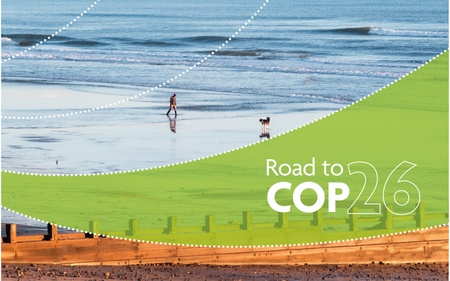A 'Mock COP' event for school pupils in Aberdeen and Aberdeenshire is one of several initiatives that the University of Aberdeen is undertaking as part of its 'Road to COP26' activities to mark the global climate conference in Glasgow next month.
Up to 60 secondary school pupils from schools across Aberdeen and Aberdeenshire will take part in the online role play event, which takes place on Thursday, 28 October.
Mirroring the format of COP26, it will see small teams from each school participate in discussions, negotiations and voting on important climate issues. Each group will be representing a COP actor – for example a country, special interest group, or a corporation, each with its own objectives in the negotiations and who will vote on resolutions.
The aim is to give pupils an insight into climate change negotiations and its complexities, ahead of the start of COP26 on Monday, 1 November.
As part of the University's Road to COP26 activities there are also plans to place a time capsule in the University’s Cruickshank Botanic Gardens which will contain, among other items, messages from local primary schoolchildren about their hopes for the environment. The capsule will be placed on Friday 12 November, the final day of COP26, and will be opened on Founders’ Day 2040 (10 February and the University’s 545th birthday).
A corresponding digital climate capsule, which will exist online and contain messages and pledges about climate change from University students, staff and alumni, will also be created and opened on the same day.
Meanwhile, the University has been actively encouraging engagement in COP26 among its students and staff, with many students attending the summit as observers, facilitated by the University. An online ‘hackathon’ event taking place between 3-5 November to coincide with the conference will see teams of students share their ideas and solutions to tackle climate change and its consequences, by co-creating and presenting ideas related to COP26 topics.
In addition, the University is delivering a series of expert-led online seminars exploring topics such as renewable energy, transport, climate change and net-zero. The COP26: Sustainable Futures seminar series is open to the public and is free to attend.
Professor David Burslem, from the University’s School of Biological Sciences, is the University’s Interdisciplinary Director for Environment and Biodiversity, and is involved in the organisation of the Mock COP event for local schools.
He said: “COP26 is a hugely significant event, particularly as it is taking place in Scotland, and we want to ensure that we maximise the opportunities for our students, staff and the wider community here in the north-east of Scotland.
“Getting young people excited by and engaged with COP26 is our main priority, which is why we are holding a Mock COP for local school pupils, helping them gain an insight as to what is happening in the negotiations and taking them on an important journey through climate change negotiations, the actors involved, and the problems faced.
“We’re also excited to be engaging our own students in activities as part of our Road to COP26, including our hackathon which will take place next month and coincide with the summit itself. We are really pleased that so many of our students are actively engaged in our Road to COP26 activities, including as observers at the event itself following our call for applications.”
Jenny Milne, who is a PhD student at the University studying transport and mobility, will be attending COP26 as an observer. Jenny is the founder of Scottish Rural and Islands Transport Community (SRITC), which campaigns for better sustainable travel for rural communities.
She said: “This is an exciting opportunity to see and learn first-hand about the role COP26 will play not only for Scotland but countries around the world.
“The movement of people and goods is vital to successful economic growth, as we continue to explore how to decarbonise economies and in turn transportation, which I have a particular interest in through my role with SRITC.
“I hope to hear about some practical solutions that might enable better sustainable travel, and not just top-level policy objectives.”
University Senior Vice-Principal Karl Leydecker, who leads on Sustainability at the University, added:
“Through our Aberdeen 2040 Strategy we have made a clear commitment to show leadership in working for the sustainable future of our planet. Academically, we are world leaders in climate science and the energy transition, and it is important that the University is visible in discussions and activities around COP26 that seek to engage our students, staff, and the wider community.
“The strength of our academic and institutional sustainability activities is reflected in the most recent Times Higher Education Impact Rankings, where we were ranked among the top 60 universities in the world in terms of our positive impact on society, based on our contribution to the achievement of the United Nations’ 17 Sustainable Development Goals.”


